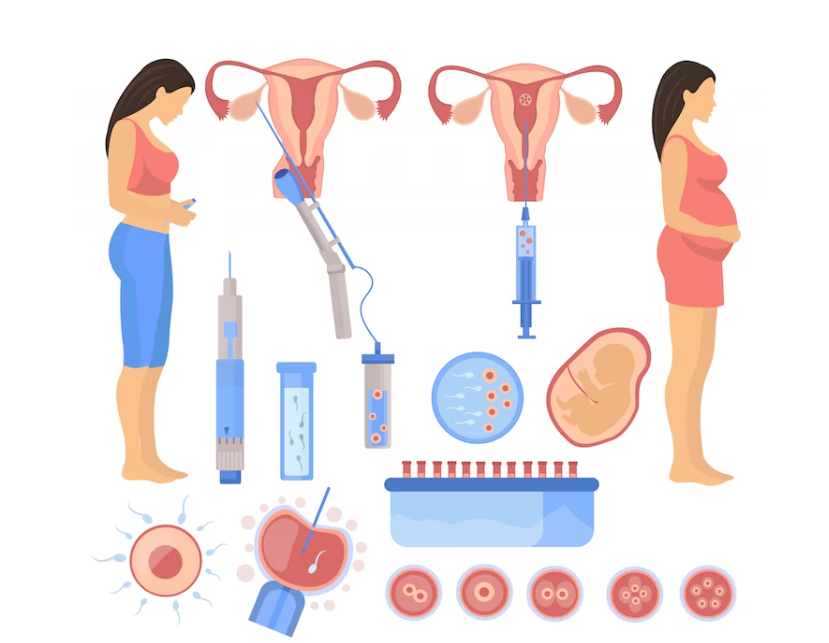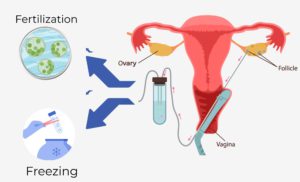Egg Retrieval Procedure


The Egg Retrieval procedure is a significant step in vitro fertilization (IVF). As with any significant action, there may be a flurry of inquiries regarding the steps involved and what is required to produce the greatest outcomes. egg retrieval is a surgical procedure. The procedure involves collecting eggs from a woman’s ovaries so that they can be fertilized in a laboratory with sperm. Typically, egg retrieval is done under light sedation or general anesthesia.
You can get more information about egg retrieval in this short article:
Why Egg Retrieval Is Crucial
Egg retrieval is a critical aspect of IVF, as it directly impacts the success of the entire fertility treatment. The procedure is typically recommended for various reasons, including:
- Ovulatory Disorders: Women with irregular or absent ovulation may require egg retrieval to ensure a sufficient number of mature eggs are available for fertilization.
- Blocked Fallopian Tubes: When the fallopian tubes are blocked, preventing the egg and sperm from meeting naturally, IVF with egg retrieval becomes the preferred method of fertilization.
- Diminished Ovarian Reserve: Women with reduced ovarian reserve, characterized by a low quantity or quality of eggs, can benefit from egg retrieval to maximize their chances of conceiving.
Tests before egg retrieval
Before IVF treatment, your doctor needs to know your and your partner’s blood group and follicle-stimulating (FSH), LH, Prolactin, TSH, AMH, and Estradiol hormone levels.
Ovarian reserve testing examines the quality and quantity of women’s eggs. Analyzing your blood test results by evaluating your anti-mullerian hormone, estrogen, and follicle-stimulating hormone levels with an ultrasound scan can help your doctor understand your ovarian reserve.
For male patients blood tests and semen analysis are required.
Medications are required for egg retrieval.
For female patients undergoing IVF cycles, fertility specialists frequently prescribe a range of fertility medicines.
These drugs are used to stimulate the ovaries by increasing FSH and LH levels, which helps produce multiple eggs. Women’s age and ovarian reserve are two important factors that can change the dosage needed for these medications. Typically, these hormones are taken for a period of 10 to 14 days. In certain cases, additional time may be needed for successful stimulation.
A vaginal ultrasound examination is performed one week after beginning these medications to assess the ovaries and determine the follicle count. A follicle is a fluid-filled sac that holds the egg. Each follicle normally carries one egg.
The effectiveness of the patient’s response to fertility medications can be assessed by counting the follicles and measuring their size, which indicates the maturity of the eggs. These follicles will develop over the course of the patient’s treatment (approximately 3 mm in 2 days), and at some point, they will be prepared for retrieval.
The patient will be advised to administer an HCG trigger shot 36 hours prior to egg retrieval once the doctor confirms the follicles are prepared for retrieval. It is important to take this medication at the designated time.
The Egg Retrieval Process
- Ovarian Stimulation: Before egg retrieval, female patients undergo a period of ovarian stimulation. Fertility medications are prescribed to encourage the ovaries to produce multiple eggs. The dosage and duration of medication are personalized based on the patient’s age and ovarian reserve.
- Monitoring: Throughout the ovarian stimulation phase, patients are monitored closely through blood tests and ultrasounds to assess hormone levels and follicle development. Follicles are fluid-filled sacs that house the eggs, and their growth is a crucial indicator of egg maturity.
- Trigger Shot: Once the follicles reach an optimal size and maturity, a trigger shot of Human Chorionic Gonadotropin (HCG) is administered approximately 36 hours before the scheduled egg retrieval. This ensures that the eggs are primed for collection.
- Egg Retrieval: The procedure typically takes place in a specialized fertility clinic or hospital, usually under light anesthesia or general anesthesia. A thin needle is inserted through the vaginal wall, guided by ultrasound, to reach the ovaries. Suction is used to gently aspirate the mature eggs from the follicles. The entire procedure lasts about 10 to 30 minutes.


Recovery and Aftercare
The recovery period following egg retrieval is generally short, with most women able to return to their daily activities within a few days. Some may experience mild cramping and spotting, but this is considered normal and usually subsides quickly.
Patients are closely monitored immediately after the procedure to ensure they are recovering well. It’s essential to follow any post-retrieval instructions provided by the healthcare team, including taking any prescribed medications and attending follow-up appointments.
How long is the recovery period of egg retrieval?
The recovery period for egg retrieval is usually short. Most women are able to go back to their normal activities within a few days. However, it is important to listen to your body and take it easy during the recovery period.
After egg retrieval, the woman will be monitored for a few hours to make sure that she is recovering well. She may experience some mild cramping or bleeding, but this is usually nothing to be concerned about. Most women are able to go home on the same day as their egg retrieval.
Fertilization and Embryo Development
Once the eggs are collected, they are immediately transferred to the laboratory, where they are fertilized with sperm, either through conventional insemination or intracytoplasmic sperm injection (ICSI). The resulting embryos are closely monitored and cultured for several days, typically 3-5, to allow for the selection of the healthiest embryos for transfer back into the woman’s uterus.
Here are some additional things to know about egg retrieval in IVF:
- The procedure is usually performed 34-36 hours after the woman takes a trigger shot of HCG. This medication helps to ensure that the eggs are mature and ready to be retrieved.
- The number of eggs retrieved during egg retrieval can vary from woman to woman. The average number of eggs retrieved is 10-12, but some women may retrieve more or fewer eggs.
- The eggs that are retrieved are then fertilized with sperm in a laboratory. The fertilized eggs, or embryos, are then cultured for several days before being transferred back to the woman’s uterus.
What are the risks of egg retrieval?
If you are wondering about the safety of egg retrieval, you should be sure that it is a safe and simple procedure. However, there are some risks associated with the procedure, such as infection, bleeding, and ovarian hyperstimulation syndrome (OHSS). These risks are rare, but it is important to discuss them with your doctor before undergoing egg retrieval.
Conclusion
The egg retrieval procedure is a crucial and carefully orchestrated step in the IVF process, providing hope and opportunity for individuals and couples facing infertility. By understanding the steps involved, the significance of the procedure, and the potential risks, patients can approach the process with confidence, knowing they are taking a significant step toward building or expanding their families. Open communication with healthcare providers, thorough preparation, and post-retrieval care are essential components of a successful egg retrieval experience.



